高考英语易混易错词汇短语辨析大全
- 格式:doc
- 大小:252.50 KB
- 文档页数:31
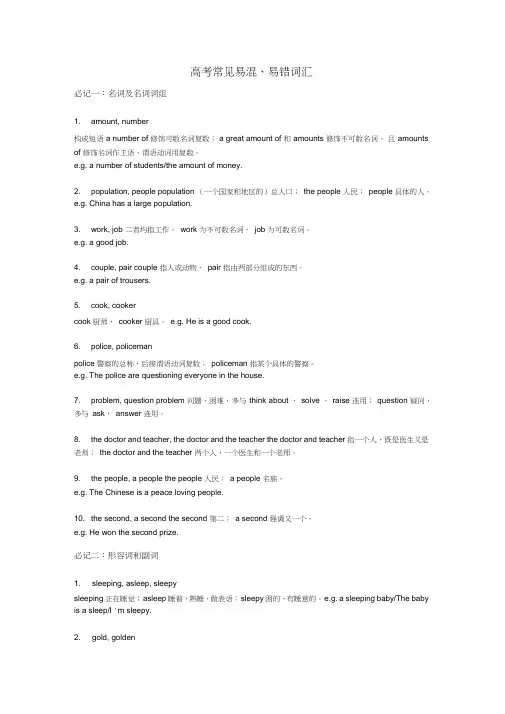
高考常见易混、易错词汇必记一:名词及名词词组1. amount, number构成短语a number of 修饰可数名词复数;a great amount of 和amounts 修饰不可数名词。
且amounts of 修饰名词作主语,谓语动词用复数。
e.g. a number of students/the amount of money.2. population, people population (一个国家和地区的)总人口;the people 人民;people 具体的人。
e.g. China has a large population.3. work, job 二者均指工作。
work 为不可数名词,job 为可数名词。
e.g. a good job.4. couple, pair couple 指人或动物,pair 指由两部分组成的东西。
e.g. a pair of trousers.5. cook, cookercook 厨师,cooker 厨具。
e.g. He is a good cook.6. police, policemanpolice 警察的总称,后接谓语动词复数;policeman 指某个具体的警察。
e.g. The police are questioning everyone in the house.7. problem, question problem 问题、困难,多与think about ,solve ,raise 连用;question 疑问,多与ask,answer 连用。
8. the doctor and teacher, the doctor and the teacher the doctor and teacher 指一个人,既是医生又是老师;the doctor and the teacher 两个人,一个医生和一个老师。
9. the people, a people the people 人民;a people 名族。
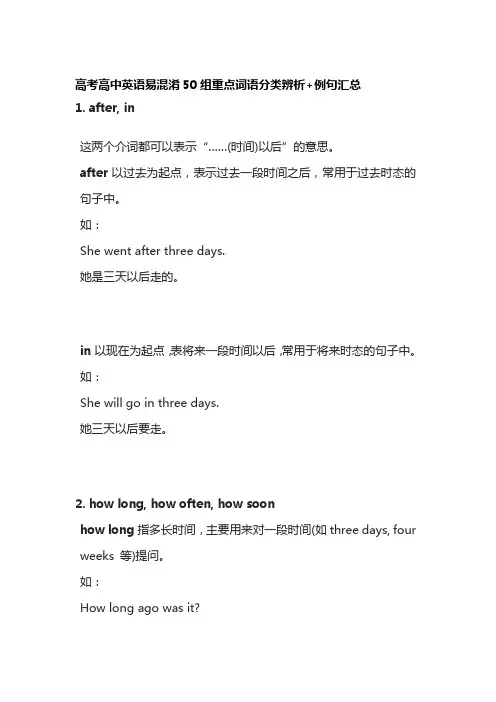
高考高中英语易混淆50组重点词语分类辨析+例句汇总1. after, in这两个介词都可以表示“……(时间)以后”的意思。
after以过去为起点,表示过去一段时间之后,常用于过去时态的句子中。
如:She went after three days.她是三天以后走的。
in以现在为起点,表将来一段时间以后,常用于将来时态的句子中。
如:She will go in three days.她三天以后要走。
2. how long, how often, how soonhow long指多长时间,主要用来对一段时间(如three days, four weeks 等)提问。
如:How long ago was it?这是多久前的事了?how often指每隔多久,主要用来对频率副词或状语(如once a week等)提问。
如:—How often does he come here? —Once a month.他(每隔)多久来一次?每月一次?how soon指再过多久,主要用来对表示将来的一段时间(in an hour, in two weeks 等)提问。
如:How soon can you come?你多快能赶来?3. few, a few, little, a little, several, somefew 和little的意思是否定的,表示“很少”或“几乎没有”;而a few和a little的意思是肯定的,表示“有一些,有一点儿”。
few 和a few修饰可数名词;little 和a little 修饰不可数名词。
several用于修饰可数名词,语意比a few和some更肯定,含有“好几个”的意思。
some可修饰可数名词,也可修饰不可数名词,从数量上说,它有时相当于a few 或a little,有时指更多一些的数量。
4. the other, anotherthe other指两个人或事物中的“另一个”,表示特指。
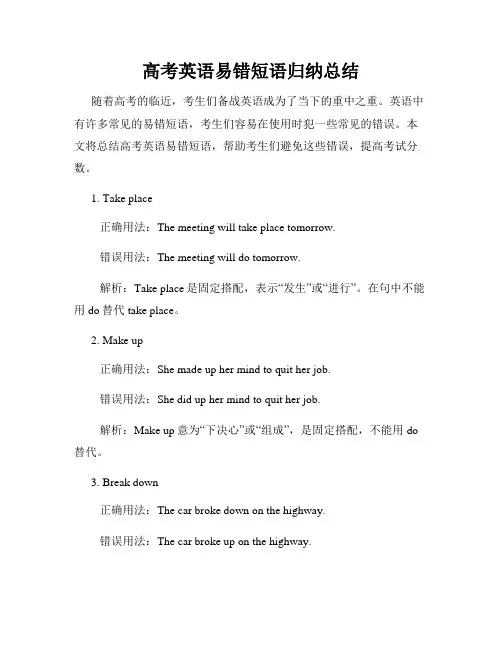
高考英语易错短语归纳总结随着高考的临近,考生们备战英语成为了当下的重中之重。
英语中有许多常见的易错短语,考生们容易在使用时犯一些常见的错误。
本文将总结高考英语易错短语,帮助考生们避免这些错误,提高考试分数。
1. Take place正确用法:The meeting will take place tomorrow.错误用法:The meeting will do tomorrow.解析:Take place是固定搭配,表示“发生”或“进行”。
在句中不能用do替代take place。
2. Make up正确用法:She made up her mind to quit her job.错误用法:She did up her mind to quit her job.解析:Make up意为“下决心”或“组成”,是固定搭配,不能用do 替代。
3. Break down正确用法:The car broke down on the highway.错误用法:The car broke up on the highway.解析:Break down意为“故障”,而不是“分手”。
在句中不能用break up替代。
4. Give up正确用法:He gave up smoking and drinking.错误用法:He gave off smoking and drinking.解析:Give up意为“放弃”,不能用give off替代。
5. Look forward to正确用法:I'm looking forward to seeing you.错误用法:I'm looking at seeing you.解析:Look forward to意为“期待”,常与动名词搭配,不能用look at替代。
6. Run out of正确用法:We ran out of milk, so we need to buy more.错误用法:We ran out with milk, so we need to buy more.解析:Run out of意为“用完”,不能用run out with替代。
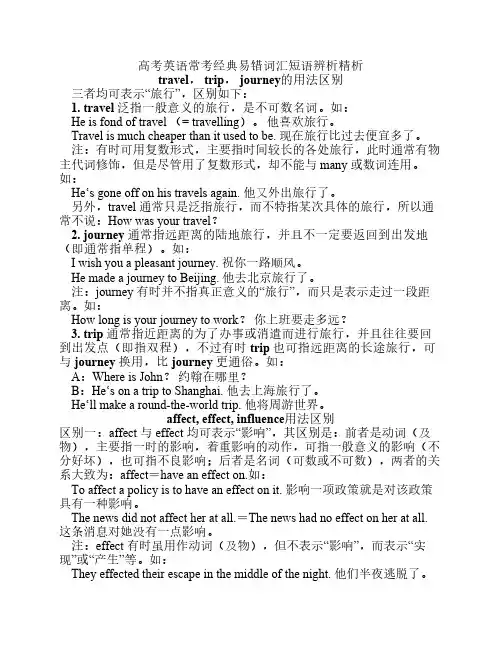
高考英语常考经典易错词汇短语辨析精析travel, trip, journey的用法区别三者均可表示“旅行”,区别如下:1. travel 泛指一般意义的旅行,是不可数名词。
如:He is fond of travel (= travelling)。
他喜欢旅行。
Travel is much cheaper than it used to be. 现在旅行比过去便宜多了。
注:有时可用复数形式,主要指时间较长的各处旅行,此时通常有物主代词修饰,但是尽管用了复数形式,却不能与 many 或数词连用。
如:He‘s gone off on his travels again. 他又外出旅行了。
另外,travel 通常只是泛指旅行,而不特指某次具体的旅行,所以通常不说:How was your travel?2. journey 通常指远距离的陆地旅行,并且不一定要返回到出发地(即通常指单程)。
如:I wish you a pleasant journey. 祝你一路顺风。
He made a journey to Beijing. 他去北京旅行了。
注:journey 有时并不指真正意义的“旅行”,而只是表示走过一段距离。
如:How long is your journey to work?你上班要走多远?3. trip 通常指近距离的为了办事或消遣而进行旅行,并且往往要回到出发点(即指双程),不过有时 trip 也可指远距离的长途旅行,可与 journey 换用,比 journey 更通俗。
如:A:Where is John?约翰在哪里?B:He‘s on a trip to Shanghai. 他去上海旅行了。
He‘ll make a round-the-world trip. 他将周游世界。
affect, effect, influence用法区别区别一:affect 与 effect 均可表示“影响”,其区别是:前者是动词(及物),主要指一时的影响,着重影响的动作,可指一般意义的影响(不分好坏),也可指不良影响;后者是名词(可数或不可数),两者的关系大致为:affect=have an effect on.如:To affect a policy is to have an effect on it. 影响一项政策就是对该政策具有一种影响。
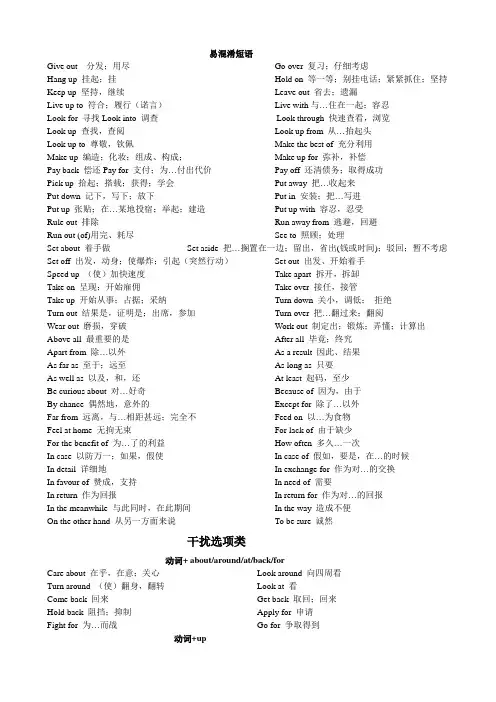
易混淆短语Give out 分发;用尽Go over 复习;仔细考虑Hang up 挂起;挂Hold on 等一等;别挂电话;紧紧抓住;坚持Keep up 坚持,继续Leave out 省去;遗漏Live up to 符合;履行(诺言)Live with与…住在一起;容忍Look for 寻找Look into 调查Look through 快速查看,浏览Look up 查找,查阅Look up from 从…抬起头Look up to 尊敬,钦佩Make the best of 充分利用Make up 编造;化妆;组成、构成;Make up for 弥补,补偿Pay back 偿还Pay for 支付;为…付出代价Pay off 还清债务;取得成功Pick up 拾起;搭载;获得;学会Put away 把…收起来Put down 记下,写下;放下Put in 安装;把…写进Put up 张贴;在…某地投宿;举起;建造Put up with 容忍,忍受Rule out 排除Run away from 逃避,回避Run out (of)用完、耗尽See to 照顾;处理Set about 着手做Set aside 把…搁置在一边;留出,省出(钱或时间);驳回;暂不考虑Set off 出发,动身;使爆炸;引起(突然行动)Set out 出发、开始着手Speed up (使)加快速度Take apart 拆开,拆缷Take on 呈现;开始雇佣Take over 接任,接管Take up 开始从事;占据;采纳Turn down 关小,调低;拒绝Turn out 结果是,证明是;出席,参加Turn over 把…翻过来;翻阅Wear out 磨损,穿破Work out 制定出;锻炼;弄懂;计算出Above all 最重要的是After all 毕竟;终究Apart from 除…以外As a result 因此、结果As far as 至于;远至As long as 只要As well as 以及,和,还At least 起码,至少Be curious about 对…好奇Because of 因为,由于By chance 偶然地,意外的Except for 除了…以外Far from 远离,与…相距甚远;完全不Feed on 以…为食物Feel at home 无拘无束For lack of 由于缺少For the benefit of 为…了的利益How often 多久…一次In case 以防万一;如果,假使In case of 假如,要是,在…的时候In detail 详细地In exchange for 作为对…的交换In favour of 赞成,支持In need of 需要In return 作为回报In return for 作为对…的回报In the meanwhile 与此同时,在此期间In the way 造成不便On the other hand 从另一方面来说To be sure 诚然干扰选项类动词+ about/around/at/back/forCare about 在乎,在意;关心Look around 向四周看Turn around (使)翻身,翻转Look at 看Come back 回来Get back 取回;回来Hold back 阻挡;抑制Apply for 申请Fight for 为…而战Go for 争取得到动词+upClose up 关闭;停业Cut up 切开;把…切成小块Divide up 分享;分配Eat up 吃光Fill up 填充,填满Finish up 最后处于,终于;吃完Give up 放弃Go up (价格、数量等)上升Hold up 举起;支撑Join up 联合起来Pack up 打点行李;打包,装箱Pull up (使车)停下动词+ offCome off 脱落,掉落,分开;成功Cut off 切掉,割掉Get off 别碰;下班;脱下;离开Give off 发出(气味、光等),长出(枝等)Hold off 挡住,耽搁Leave off 停止Put off 推迟,拖延Show off 炫耀Start off 出发;(使)开始走红Take off 关掉Turn off动词+on/uponAgree on 对…意见一致Focus on/upon 集中在,聚焦在,关注Get on 继续Go back on 回顾Move on 继续进行Put on 穿上;上演,演出;假装Turn on 打开;启动Wait on 服侍,招待动词+over/withCome over 突然感到;顺便来访Look over 浏览Deal with 处理,应付,对付动词+ downGet down 写下Hand down 传给后代Set down 写下,记下;制定,规定Settle down 使某人安静下来;安顿下来;认真着手做Show down 使慢下来;使减速;放松Take down 拿下,取下;记下,写下Tear down 推倒,拆毁动词+in/intoDrop in 投进;偶然来访,顺便走访Take in 理解;欺骗;接受Turn in 上交;交还;产生Go into 从事;用于;进入(某种状态或情况)Run into 遇到,撞到Break in/into 闯入Come in/into 进入动词+toAgree to 同意(决定、计划、安排、建议等)Get to 到达Lead to 导致;通向Refer to 提到,谈到;参考;涉及Stick to 坚持;继续做Turn to 翻到;求助于According to 根据As a matter of fact 实际上As much as 像…那样多At heart 心底里,本质上At once 立刻,马上At will 任意,随意Better than 好于,胜过,比…好By means of 凭借,以…方法By nature 本性,天生的Due to 因为,由于;归功于For fear of 唯恐,以免(发生危险)For the purpose of 为了…目的Generally speaking 一般来说In a word 总而言之In addition to 除…以外In agreement with 同意,与…达成一致In all 总共,共计,合计In charge of 负责,主管(表示主动意义)In effect 实际上,事实上In fact 事实上In front of 在…前面In general 大体上In honour of 纪念;为向…表示敬意In particular 尤其,特别In place 在适当的位置In place of 代替,取代In praise of 为赞扬In reference to 胜于,优先于In preparation 准备In response to 回答,响应In search of 寻找,寻求In short 总之,简言之In sight 在视野内In terms of 就…而言In the direction of 朝…方向In the end 最终,终于In the face of 面对In turn 依次地,轮流地;相应的In vain 徒劳,无结果;白白地In view of 鉴于,考虑到Instead of 代替,而不是Less than 少于Moe or less 或多或少Next to 相邻,紧挨着On account of 因为,由于On purpose 故意地On the line 冒风险On the whole 总的来说,大体上On time 准时地On top of 在…的顶部On watch 监视Other than 除了Out of order 出故障,失灵Out of question 毫无疑问Out reach 手不能及;非某人能力所及Rather than 而不是Regardless of 不管,不顾Sooner or later 迟早To be exact 确切的说,准确的说。

高中生易错短语大全1. Look forward to与looking forward to的区别- Look forward to表示期待、盼望,后接名词或doing sth. 形式- Looking forward to是它的现在分词,不能直接接名词,后接doing sth. 形式。
例如:I am looking forward to hearing from you soon.2. By accident与on purpose的区别- By accident指“偶然地,意外地”,与其相对的是on purpose,表示“故意地”,例如:She broke the vase by accident.- On purpose还有两种相似的说法是intentionally和deliberately。
3. Affect 与Effect 的区别- Affect 为动词,影响的意思,例如:The cold weather affected the crops.- Effect 为名词,效果、结果的意思,例如:The effect of the medicine was good.4. Allusion与Illusion的区别- Allusion 暗指,指间接提到某个事物或概念,例如:In his speech, the politician made an allusion to Shakespeare's work.- Illusion 错觉,指客观上不存在的事物,例如:The magician creates an illusion of disappearing.5. Farther和Further的区别- Farther 表示距离上的更远,例如:My house is farther away from the shopping mall than yours.- Further 表示程度上的进一步,例如:We need further discussion.6. Fewer 和 Less 的区别- Fewer 表示可数名词的数量较少,例如:Fewer students attended the party than we expected.- Less 表示不可数名词的数量较少,例如:There is less water in the bottle.7. Lose 和 Loose 的区别- Lose 表示不能找到或者丢失,例如:I always lose my keys.- Loose 表示松开,不紧的,例如:My pants are too loose.8. Accept 和 Except 的区别- Accept 表示接受,例如:I accept your apology.- Except 表示除去之外,例如:Everyone is here except him.10. Principle 和 Principal 的区别- Principle 表示原则,例如:He is a man of principle.- Principal 表示最重要的,例如:The principal gave a speech at the graduation ceremony.易错短语平时很容易混淆,但是只要稍加练习,多读多写,就能够避免常见错误,使英语表达更加准确。
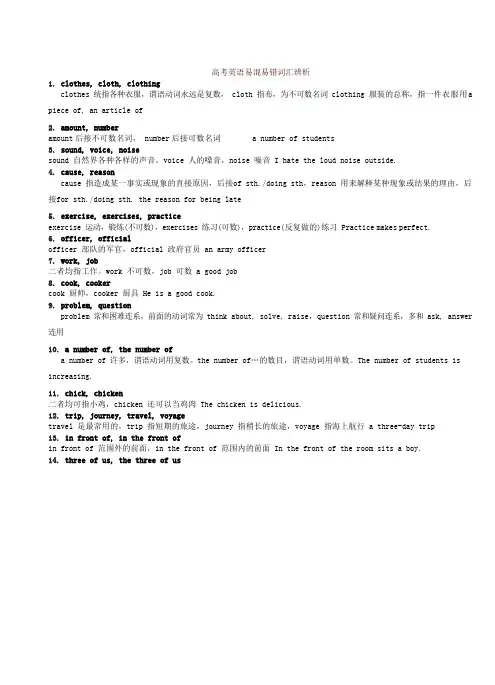
高考英语易混易错词汇辨析1.clothes, cloth, clothingclothes 统指各种衣服,谓语动词永远是复数, cloth 指布,为不可数名词 clothing 服装的总称,指一件衣服用a piece of, an article of2.amount, numberamount 后接不可数名词, number 后接可数名词 a number of students3.sound, voice, noisesound 自然界各种各样的声音,voice 人的嗓音,noise 噪音 I hate the loud noise outside.4.cause, reasoncause 指造成某一事实或现象的直接原因,后接of sth./doing sth,reason 用来解释某种现象或结果的理由,后接for sth./doing sth. the reason for being late5.exercise, exercises, practiceexercise 运动,锻炼(不可数),exercises 练习(可数),practice(反复做的)练习 Practice makes perfect.6.officer, officialofficer 部队的军官,official 政府官员 an army officer7.work, job二者均指工作。
work 不可数,job 可数 a good job8.cook, cookercook 厨师,cooker 厨具 He is a good cook.9.problem, questionproblem 常和困难连系,前面的动词常为 think about, solve, raise,question 常和疑问连系,多和 ask, answer 连用10. a number of, the number ofa number of 许多,谓语动词用复数。
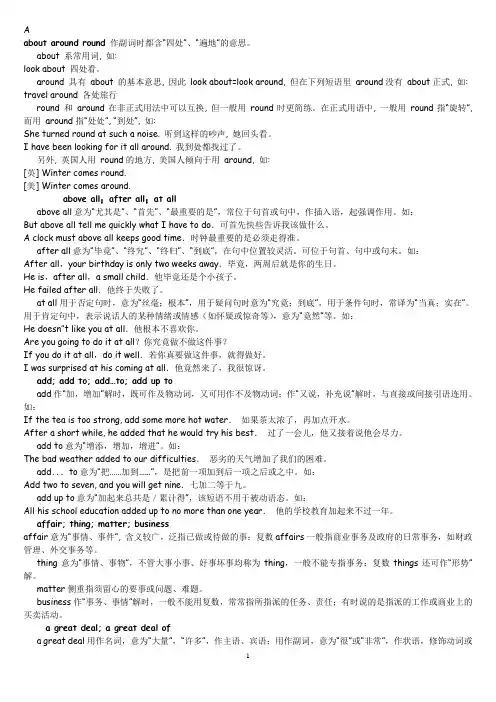
Aabout around round作副词时都含“四处”、“遍地”的意思。
about 系常用词, 如:look about 四处看。
around 具有about 的基本意思, 因此look about=look around, 但在下列短语里around没有about正式, 如: travel around 各处旅行round 和around在非正式用法中可以互换, 但一般用round时更简练。
在正式用语中, 一般用round指“旋转”, 而用around指“处处”, “到处”, 如:She turned round at such a noise. 听到这样的吵声, 她回头看。
I have been looking for it all around. 我到处都找过了。
另外, 英国人用round的地方, 美国人倾向于用around, 如:[英] Winter comes round.[美] Winter comes around.above all;after all;at allabove all意为“尤其是”、“首先”、“最重要的是”,常位于句首或句中,作插入语,起强调作用。
如:But above all tell me quickly what I have to do.可首先快些告诉我该做什么。
A clock must above all keeps good time.时钟最重要的是必须走得准。
after all意为“毕竟”、“终究”、“终归”、“到底”,在句中位置较灵活。
可位于句首、句中或句末。
如:After all,your birthday is only two weeks away.毕竟,两周后就是你的生日。
He is,after all,a small child.他毕竟还是个小孩子。
He failed after all.他终于失败了。
at all用于否定句时,意为“丝毫;根本”,用于疑问句时意为“究竟;到底”,用于条件句时,常译为“当真;实在”。
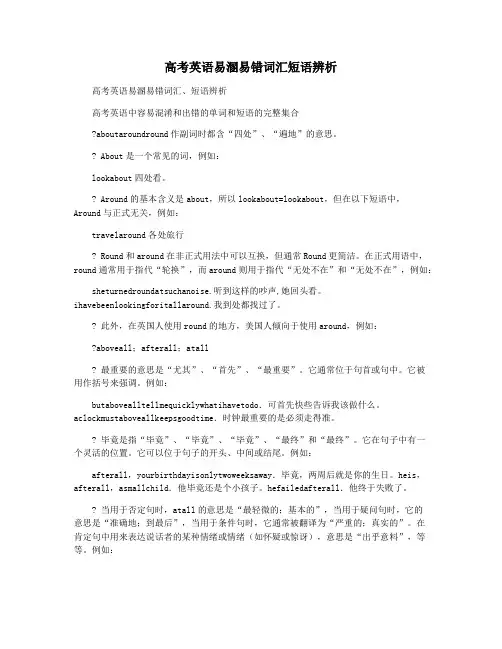
高考英语易溷易错词汇短语辨析高考英语易溷易错词汇、短语辨析高考英语中容易混淆和出错的单词和短语的完整集合aboutaroundround作副词时都含“四处”、“遍地”的意思。
About是一个常见的词,例如:lookabout四处看。
Around的基本含义是about,所以lookabout=lookabout,但在以下短语中,Around与正式无关,例如:travelaround各处旅行Round和around在非正式用法中可以互换,但通常Round更简洁。
在正式用语中,round通常用于指代“轮换”,而around则用于指代“无处不在”和“无处不在”,例如:sheturnedroundatsuchanoise.听到这样的吵声,她回头看。
ihavebeenlookingforitallaround.我到处都找过了。
此外,在英国人使用round的地方,美国人倾向于使用around,例如:aboveall;afterall;atall最重要的意思是“尤其”、“首先”、“最重要”。
它通常位于句首或句中。
它被用作括号来强调。
例如:butabovealltellmequicklywhatihavetodo.可首先快些告诉我该做什么。
aclockmustaboveallkeepsgoodtime.时钟最重要的是必须走得准。
毕竟是指“毕竟”、“毕竟”、“毕竟”、“最终”和“最终”。
它在句子中有一个灵活的位置。
它可以位于句子的开头、中间或结尾。
例如:afterall,yourbirthdayisonlytwoweeksaway.毕竟,两周后就是你的生日。
heis,afterall,asmallchild.他毕竟还是个小孩子。
hefailedafterall.他终于失败了。
当用于否定句时,atall的意思是“最轻微的;基本的”,当用于疑问句时,它的意思是“准确地;到最后”,当用于条件句时,它通常被翻译为“严重的;真实的”。

高考英语易混易错词汇辨析200组1. clothes, cloth, clothingclothes统指各种衣服,谓语动词永远是复数, cloth指布,为不可数名词clothing 服装的总称,指一件衣服用a piece of, an article of2. incident, accidentincident指小事件, accident指不幸的事故He was killed in the accident.3. amount, numberamount后接不可数名词, number后接可数名词 a number of students 4. family, house, homehome 家,包括住处和家人,house房子,住宅,family家庭成员. My family is a happy one. 5. sound, voice, noisesound自然界各种各样的声音,voice人的嗓音,noise噪音I hate the loud noise outside. 6. photo, picture, drawingphoto用照相机拍摄的照片,picture可指相片,图片,电影片,drawing画的画 Let's go and see a good picture.7. vocabulary, wordvocabulary词汇,一个人拥有的单词量,word具体的单词He has a large vocabulary. 8. population, peoplepopulation人口,人数,people具体的人 China has a large population. 9. weather, climateweather一天内具体的天气状况,climate长期的气候状况 The climate here is not good for you.10. road, street, path, wayroad具体的公路,马路,street街道,path小路,小径,way道路,途径take this road; in the street, show me the way to the museum.11. course, subjectcourse课程(可包括多门科目),subject科目(具体的学科)a summer course 12. custom, habitcustom传统风俗,习俗,也可指生活习惯,后接to do, habit生活习惯,习惯成自然,后接of doing. I've got the habit of drinking a lot. 13. cause,reasoncause 指造成某一事实或现象的直接原因,后接of sth./doing sth,reason用来解释某种现象或结果的理由,后接for sth./doing sth. the reason for being late 14. exercise, exercises, practiceexercise运动,锻炼(不可数),exercises练习(可数),practice(反复做的)练习 Practice makes perfect.15. class, lesson作"课"解时,两者可以替换.指课文用lesson. 指班级或全体学生用class. lesson 6; class 5 16. speech, talk, lecturespeech指在公共场所所做的经过准备的较正式的演说,talk日常生活中的一般的谈话,讲话,lecture学术性的演讲,讲课 a series of lecture on…17. officer, officialofficer部队的军官,official政府官员 an army officer18. work, job二者均指工作。
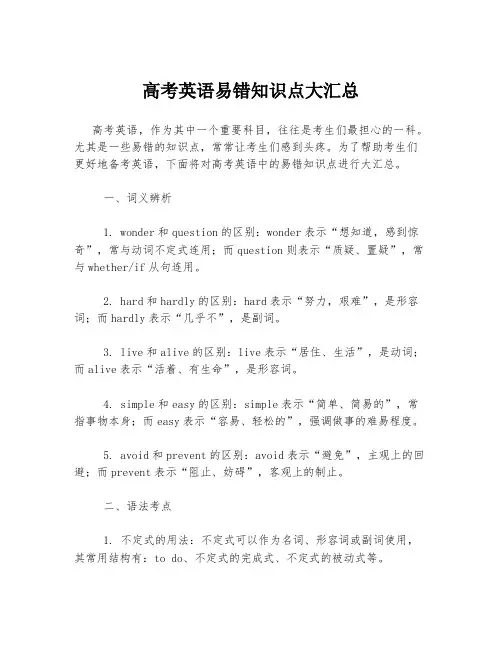
高考英语易错知识点大汇总高考英语,作为其中一个重要科目,往往是考生们最担心的一科。
尤其是一些易错的知识点,常常让考生们感到头疼。
为了帮助考生们更好地备考英语,下面将对高考英语中的易错知识点进行大汇总。
一、词义辨析1. wonder和question的区别:wonder表示“想知道,感到惊奇”,常与动词不定式连用;而question则表示“质疑、置疑”,常与whether/if从句连用。
2. hard和hardly的区别:hard表示“努力,艰难”,是形容词;而hardly表示“几乎不”,是副词。
3. live和alive的区别:live表示“居住、生活”,是动词;而alive表示“活着、有生命”,是形容词。
4. simple和easy的区别:simple表示“简单、简易的”,常指事物本身;而easy表示“容易、轻松的”,强调做事的难易程度。
5. avoid和prevent的区别:avoid表示“避免”,主观上的回避;而prevent表示“阻止、妨碍”,客观上的制止。
二、语法考点1. 不定式的用法:不定式可以作为名词、形容词或副词使用,其常用结构有:to do、不定式的完成式、不定式的被动式等。
2. 动名词和不定式的区别:动名词以-ing结尾,可以作主语、宾语、表语等;而不定式以to加动词原形构成。
3. 虚拟语气的用法:在某些条件句和感叹句中,常使用虚拟语气来表示与事实相反的假设。
虚拟语气的主要形式有:虚拟条件句、虚拟宾语从句、虚拟表语从句等。
4. 倒装句的用法:在某些特殊情况下,主语和谓语动词的位置可以颠倒过来,形成倒装句。
常见的倒装句有完全倒装和部分倒装两种形式。
5. 主谓一致的考题:主谓一致是指主语与谓语动词在人称和数上保持一致。
要注意的是,一些集体名词和复数名词作主语时,谓语动词多数使用单数形式。
三、阅读理解1. 推测题:考生在做阅读理解时,常常需要通过上下文推测某些词语的意思。
推测题往往要求考生结合上下文,根据一些线索来确定选项的正确答案。
高考英语易混词1. adapt to 适应误:He can not adapt to the new environment.正:He can not adapt himself to the new environment.解释:固定词组,adapt to…适应…,后面接名词或动名词。
2. ache for 渴望得到误:I will ache for your help.正:I will long for your help.解释:ache for=long for,表示渴望得到。
3. acquire from 从…获得误:I acquired these goods from the market.正:I bought these goods from the market.解释:acquire表示“获得、取得”,常用于抽象意义,不用于具体事物。
而买某物应该用buy。
4. be addicted to 沉溺于误:He is addicted to drinking.正:He is addicted to alcohol.解释:be addicted to后面一般接名词,不接动名词。
表示沉溺于…应该用be addicted to sth.。
5. be allied to 与…结盟误:They are allied each other.正:They are allied to each other.解释:be allied to是固定词组,表示“与…结盟”。
6. be aligned to 与…对齐误:The car was aligned the rail road.正:The car was aligned with the rail road.解释:be aligned to是固定词组,表示“与…对齐”。
但是,align的意思是“使成一直线、使成一行”,所以应该用be aligned with表示“与…对齐”。
高中英语易混淆动词短语一、挑战与区别1. Look at: 看一看- Look after: 照料- Look for: 寻找- Look up: 查阅- Look forward to: 期待2. Call off: 取消- Call up: 打电话- Call for: 呼吁- Call on: 拜访- Call out: 大声呼喊3. Set up: 建立- Set off: 出发- Set out: 开始- Set in: 开始- Settle down: 定居4. Break down: 故障- Break up: 分手/分裂- Break in: 强行闯入- Break out: 爆发5. Take up: 开始从事- Take on: 承担/雇佣- Take off: 脱掉/起飞- Take in: 吸收/欺骗- Take out: 取出/带出去6. Work out: 锻炼- Work on: 努力从事- Work up: 激发- Work in: 将...编入- Work through: 解决7. Fill in: 填写- Fill out: 填写- Fill up: 装满- Fill with: 被...填满二、正确运用1. 关于视觉:- When you go out, could you please look after your brother? (出门的时候,你能照看一下你弟弟吗?)- The book is not on the shelf. I'll look for it. (书不在书架上,我要去找)- I need to look up the unfamiliar word in the dictionary. (我需要在字典中查找这个生词)- I'm looking forward to your visit. (我期待着你的访问)2. 关于通讯:- They decided to call off the meeting due to bad weather. (因为天气不好,他们决定取消会议)- He called up his friend to wish him a happy birthday. (他给朋友打电话祝他生日快乐)- The government called for strict measures to control pollution. (政府呼吁采取严格措施来控制污染)- Let's call on our neighbors this weekend. (这个周末我们去拜访邻居)- She called out his name, but he didn't hear her. (她高声呼喊他的名字,但他没有听见)3. 关于建立和结束:- They set up a charity to help the poor. (他们建立了一个慈善机构来帮助穷人)- We will set off for the beach early tomorrow morning. (我们明天一大早就出发去海滩)- He set out on a journey to explore the world. (他开始了一次探索世界的旅程)- Winter has set in, and it's getting colder. (冬天到来了,天气越来越冷了)- After traveling for many years, they decided to settle down in a small town. (在旅行多年后,他们决定在一个小镇安定下来)4. 关于中断和破裂:- The car broke down on the way to the airport. (汽车在去机场的路上出故障了)- They broke up after dating for three months. (他们交往了三个月后分手了)- The thieves broke in through the back door. (小偷们透过后门闯入)- A fight broke out between the two groups. (两个团体爆发了一场冲突)5. 关于开始和带走:- She decided to take up painting as a hobby. (她决定开始练习绘画作为一种爱好)- The company will take on new employees next month. (公司将于下个月雇佣新员工)- The plane will take off in ten minutes. (飞机将在十分钟后起飞)- The sponge can absorb and take in water easily. (这个海绵可以轻松吸水)- He took out a book from his bag and started reading. (他从书包里拿出一本书开始阅读)6. 关于努力和解决:- He works out in the gym three times a week to keep fit. (他每周在健身房健身三次,以保持健康)- The students are working on a science project together. (学生们正在共同进行一项科学项目)- The sad story worked up their emotions and made them cry. (这个悲伤的故事激发了他们的情绪,让他们哭了起来)- The new law will work in favor of small business owners. (新法律将有利于小企业主)- They are working through their problems and trying to find a solution. (他们正在解决问题,努力找到解决方案)7. 关于填写和装满:- Please fill in this form with your personal information. (请使用你的个人信息填写这张表格)- Don't forget to fill out the application form. (别忘了填写申请表)- The cup is almost filled up with water. (这个杯子里差不多装满了水)- The park is filled with flowers in spring. (公园在春天里被鲜花装满了)以上为高中英语易混淆动词短语的详细解释和正确运用。
高考英语易混易错词汇总结(1)1. clothes, cloth, clothingclothes统指各种衣服,谓语动词永远是复数,cloth指布,为不可数名词clothing 服装的总称,指一件衣服用a piece of, an article ofArticle N 文章冠词2. incident, accidentincident指小事件, accident指不幸的事故traffic accidentHe was killed in the accident.Confident :be confident in sth sb self-confident by her self3. amount, numberA number of students are coming out of the school= a lot ofThe number of student is 200 …的数量Amount of sthAmount of water is coming out of the glassamount后接不可数名词,number后接可数名词a number of students4. family, house, homehome 家,包括住处和家人,house房子,住宅,family家庭成员.My family is a happy one.5. sound, voice, noiseSound adj 酣睡的稳固的A sound ladderLose one’s voiceNoisy quietQuite verysound自然界各种各样的声音,voice人的嗓音,noise噪I hate the loud noise outside.6. photo, picture, drawingphoto用照相机拍摄的照片,picture可指相片,图片,电影片,drawing画的画Let's go and see a good picture.7. vocabulary, wordvocabulary词汇,一个人拥有的单词量,word具体的单词He has a large vocabulary.He knows a lot of wordsWord vocabulary phrases/expressions sentences paragraph article8. population, people,personPeoples 民族India has had the largest population in the worldpopulation人口,人数,people具体的人China has a large population.9. weather, climate, temperatureWeather :sunny rainy cloudy windy snowy stormy foggyClimate: dry wet pleasant, uncomfortableTemperature :C FDegree 度数High lowweather一天内具体的天气状况,climate长期的气候状况The climate here is not good for you.10. road, street, path, waypath:迷宫小道message from the pathroad具体的公路,马路,street街道,path小路,小径,way道路,途径take this road and turn right; in the street,show me the way to the museum.11. course, subjectcourse table time tablecourse课程(可包括多门科目),subject科目(具体的学科)a summer course12. custom, habit hobbyinterest N 爱好兴趣he has many interests利益the stock holders share their interests from the stocksV 使。
高考英语易混短语辨析高考英语易混短语辨析高考眨眼又将到来,针对同同学们薄弱的英语科,店铺为大家搜索整理了高考英语考前复习资料——易混短语辨析,希望对大家有所帮助!1. since then from then on ever since ever beforesince then意为"从那时起",通常与现在完成时连用,指从过去某一时刻起到现在为止的一段时间。
from then on意为"从那时起",通常与一般过去时连用,指过去某一时刻之后的时间。
ever since意为"自……以后,从……起",通常与延续性动词的完成时态连用。
ever before的意思是"在以往任何时候",常出现在than后面,其中before是副词,有时可以省略,ever用以加强语气。
如:He has disappeared since then.From then on he refused to talk about the thing.We’ve been friends ever since we met at school.More women are going out to work than ever before.2.on board on the board on the boardson board泛指"在船上",还可指"在飞机或火车上"。
这个短语后面也可接船名或船的类型,如:on board the Dongfeng在东风号上,on board a liner在邮轮上。
on the board除可表示"在(具体的)这艘或那艘船上"外,还可表示"在会上讨论"。
on the boards中的boards是"剧院,舞台表演"的意思,其本义是"在舞台上",现常引申为"做演员"或"演出",常用在连系动词be后作表语。
高考英语易错短语辨析辨析agree with, agree to和agree on(1)agree with的意思是“同意”,“赞成”。
后面常接表示人或意见(看法)的名词或代词作宾语。
如:Does she agree with us?她同意我们的意见吗?None of us agree with what you said.我们没有一个人同意你讲的话。
(2)agree with还有“与……一致”,“(气候、食物等)适合”的意思。
如:His words do not agree with his actions.他言行不一致。
Too much meat doesn‘t agree with her.吃太多食物对她身体不合适。
注意:agree with不能用于被动语态。
(3)agree to意为“同意”,“赞成”,后面跟表示“提议”,“办法”,“计划”,“安排”等的名词或代词。
如:Please agree to this arrangement.请同意这个安排。
This plan has now been agreed to.这个计划已经被认可了。
(4)agree on表示“对……取得一致意见”,指两方或多方就某个问题取得了一致的意见或是达成了某种协议。
如:After discussion the two sides agreed on a cease-fire.经过讨论,双方就停火问题达成了协议。
They all agree on the matter.他们在这个问题上意见一致。
besides,but,except 的用法辨析1. 基本区别三者都可表示“除外”,但besides 表示一种累加关系,意指“除了什么之外,还有……”;而 except 或 but 则表示一种排除关系,意指“除了什么之外,不再有……”。
如:Besides his wife,his daughter also went to see him. 除他妻子外,他女儿也去看过他(即妻子女儿都去看过他)。
高考常考易混词组辨析1.Humble, Lowly, Meek 谦卑Humble: 主要指对自己或自己的地位、成就等表现得谦卑,自感低卑的。
Defeat and failure make people humble.Lowly: 较文雅的用语, 指谦逊, 很少用以形容人。
He had a lowly heart.Meek: 指性情温顺的屈从他人的行为或意见He is as meek as a lamb.2.Damage: 主要指造成价值,效用,完整性方面的损坏。
The water they had thrown over everything to put out the fire damaged the books.Harm: 强调带来损失,病痛或痛苦。
Though he knows clearly that smoking harms his health, he simply cannot give it up.Hurt: 尤其指感情或身体遭受创伤。
My little boy fell off a ladder and hurt himself.You hurt my feelings!Injure: 一般常指不公正地对待或冤屈某人,即有意识地侵害别人的权利或毁坏别人的健康、成就等,也可以指外表、健康、安逸等遭受破坏The gas polluted the surroundings and injured the health of workers and residents of the area.Spoil: 强烈的毁坏毁灭之意。
指不仅造成价值,精力,兴致的损伤,还意味着可能造成某种毁灭或彻底破坏,也有宠坏的意思。
John joined the party and spoiled the pleasure of everyone by his impolite behavior.3.Can & Be able to 都可以表示能够。
Aabout around round 作副词时都含“四处”、“遍地”的意思。
about 系常用词, 如:look about 四处看。
around 具有about 的基本意思, 因此look about=look around, 但在下列短语里around没有about正式, 如:travel around 各处旅行round 和around在非正式用法中可以互换, 但一般用round时更简练。
在正式用语中, 一般用round指“旋转”, 而用around指“处处”, “到处”, 如:She turned round at such a noise. 听到这样的吵声, 她回头看。
I have been looking for it all around. 我到处都找过了。
另外, 英国人用round的地方, 美国人倾向于用around, 如:[英] Winter comes round.[美] Winter comes around.above all;after all;at allabove all意为“尤其是”、“首先”、“最重要的是”,常位于句首或句中,作插入语,起强调作用。
如:But above all tell me quickly what I have to do.可首先快些告诉我该做什么。
A clock must above all keeps good time.时钟最重要的是必须走得准。
after all意为“毕竟”、“终究”、“终归”、“到底”,在句中位置较灵活。
可位于句首、句中或句末。
如:After all,your birthday is only two weeks away.毕竟,两周后就是你的生日。
He is,after all,a small child.他毕竟还是个小孩子。
He failed after all.他终于失败了。
at all用于否定句时,意为“丝毫;根本”,用于疑问句时意为“究竟;到底”,用于条件句时,常译为“当真;实在”。
用于肯定句中,表示说话人的某种情绪或情感(如怀疑或惊奇等),意为“竟然”等。
如:He doesn”t like you at all.他根本不喜欢你。
Are you going to do it at all?你究竟做不做这件事?If you do it at all,do it well.若你真要做这件事,就得做好。
I was surprised at his coming at all.他竟然来了,我很惊讶。
add; add to; add…to; add up toadd作“加,增加”解时,既可作及物动词,又可用作不及物动词;作“又说,补充说”解时,与直接或间接引语连用。
如:If the tea is too strong, add some more hot water.如果茶太浓了,再加点开水。
After a short while, he added that he would try his best.过了一会儿,他又接着说他会尽力。
add to意为“增添,增加,增进”。
如:The bad weather added to our difficulties.恶劣的天气增加了我们的困难。
add...to意为“把……加到……”,是把前一项加到后一项之后或之中。
如:Add two to seven, and you will get nine.七加二等于九。
add up to意为“加起来总共是/累计得”,该短语不用于被动语态。
如:All his school education added up to no more than one year.他的学校教育加起来不过一年。
affair; thing; matter; businessaffair意为“事情、事件”, 含义较广,泛指已做或待做的事;复数affairs一般指商业事务及政府的日常事务,如财政管理、外交事务等。
thing意为“事情、事物”,不管大事小事、好事坏事均称为thing,一般不能专指事务;复数things还可作“形势”解。
matter侧重指须留心的要事或问题、难题。
business作“事务、事情”解时,一般不能用复数,常常指所指派的任务、责任;有时说的是指派的工作或商业上的买卖活动。
a great deal; a great deal ofa great deal用作名词,意为“大量”,“许多”,作主语、宾语;用作副词,意为“很”或“非常”,作状语,修饰动词或用来强调比较级。
如:A great deal has been studied and this is the best way.经过大量研究后,这(被认为)是最好的办法。
We are a great deal cleverer than before.我们比以前聪明多了。
a great deal of意为“大量的”,“非常多的”,相当于much,作定语,后接不可数名词。
如:A great deal of time/money/energy has been spent on the project.大量的时间/金钱/能源花在那个工程上了。
agree on;agree to;agree with;agree thatagree on作“就……取得一致意见”解。
例如:The building of a new car factory was agreed on last month.上月,就建一座新汽车厂之事达成了协议。
agree to有两层含义和用法:其一是to作为动词不定式符号,其后跟动词原形,作“同意(答应)做某事”解。
例如:My father agreed to buy a new pen for me.父亲答应给我买支新钢笔。
其二是to作为介词,之后跟表示“计划/条件/建议等一类的名词或代词”。
例如:They have a greed to our plan.他们已同意我们的计划。
agree with作“同意某人的意见”解,其后可跟表示人的名词或代词,也可跟表示“意见”或“说的话”的名词或从句。
例如:He agreed with my opinions.他同意了我的意见。
We agreed with what he said at the meeting.我们同意他在会上讲的话。
agree that作“认为……”解,其后跟宾语从句。
例如:I agree that your composition is very good.我认为你的这篇作文写得不错。
allow;let 二者均可作“允许”解,但各有侧重:allow重在“允许”或“容许”,也可表示客气的请求。
例如:He allowed me to take his dictionary.他允许我拿走他的词典。
Will you allow me to use your bike?我可以用你的自行车吗?let作“允许”或“让”解,主要用于口语,一般可与allow互换。
作“允许”解时,常暗含“听任”、“默许”之意;作“让”解时,常含“祈使”或“建议”之意。
注意:let之后作宾补的不定式不带to,且不可用于被动语态,而allow则相反。
例如:Please let me walk with you(=Please allow me to walk with you.).我(请允许我)跟你一起走。
注:allow常用于allow sb.to do sth.或allow doing sth.结构中。
although; though; as三者均可表示“尽管;虽然”,引导让步状语从句。
although用法较正式,语气较强;though较常用;as则主要用于倒装句。
它们的用法有如下几点值得注意:状语从句由although, though或as引导,主句之前不可有but, and, so, however等并列连词,但可有yet或still等副词。
although与though常可互换。
例如:Although/Though he believes it, yet he will not act.他虽然相信它,但却不肯有所行动。
as表示“尽管;虽然”,只能用于倒装句,即:将表语、状语或谓语动词放在as之前。
though也可这么用。
例如:Young as/though he is, he knows a lot.他虽然年纪不大,却懂得很多。
注意:如果表语是单数名词,要省略a。
例如:Child as/though he is, he can speak two foreign languages.虽然他是个孩子,但他会说两门外语。
though可以放在句末,表示“但是”,although却不能。
例如:They said they would come; they did not, though.他们说他们会来,可是他们并没有来。
although只用来陈述“事实”,不能表示“假设”。
因此可以说even though“即使”以及as though“好像(=as if)”,不能说even although或as although。
例如:I believe you are on duty—even though you”re in plain clothes.尽管你穿着便衣,我相信你是在值勤。
among/between这两个介词都有“在……之间”的意思。
between常用于两者之间;among一般指三者或三者以上之间。
若指三个以上人或物中的每两个之间时,仍然要用between。
例如:The girl walked between her father and mother.这个女孩走在她父亲和母亲之间。
She is the tallest among her classmates.她在她同学之间是最高的。
Switzerland lies between France,Italy,Austria and Germany.瑞士位于法国、意大利、奥地利和德国之间。
argue debate dispute 都含“辩论”的意思。
argue 着重“说理”、“论证”和“企图说服”, 如:I argued with her for a long time, but she refused to listen to reason.我和她辩论了好久, 但她还是不听。
debate 着重“双方各述己见”, 内含“交锋”的意思, 如:We have been debating about the issue. 我们一直在就这个问题进行辩论。
dispute 指“激烈争辩”, 含有“相持不下”或“未得解决”之意,如:Whether he will be elected as chairman is still disputed.他是否当选为主席, 仍然有争论。